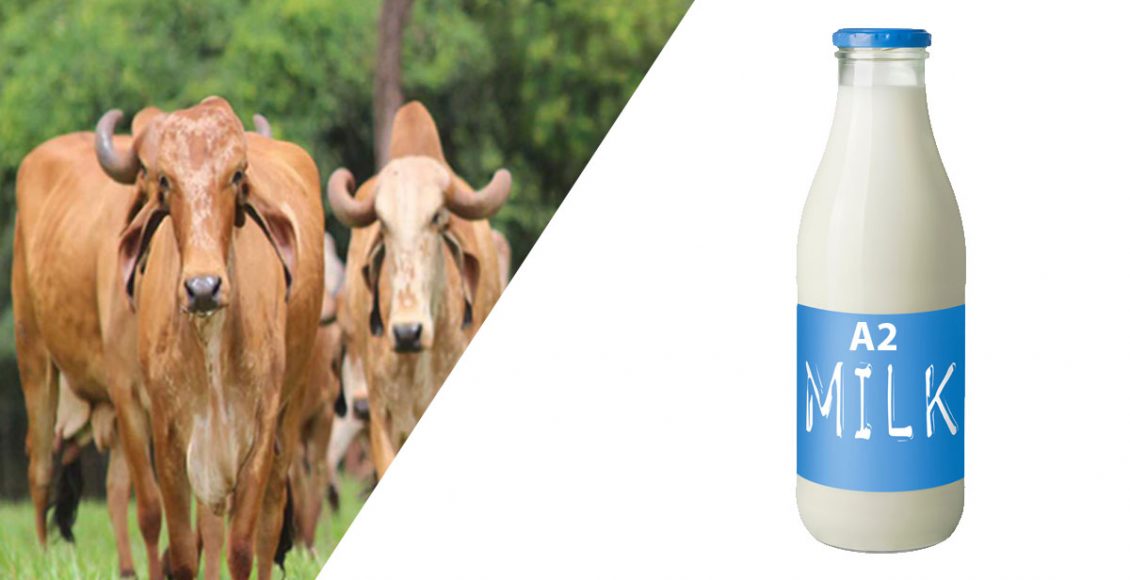
A2 branded milk in the Indian context – A case of market hype?
Interest in A2 milk increased globally ever since a New Zealand based A2 Milk Company was founded in 2000 to license intellectual property for determining what type of protein a cow produces in its milk. From 2007 onwards, the company changed its business model from licensing to a full-fledged operating company engaged in sourcing & selling branded A2 milk in New Zealand, Australia, UK & China. Larger players like Nestle too launched a range of A2 milk-based products in China for infants, pregnant women and the entire family. Several players in India have launched branded A2 milk and milk products.
A1/ A2 milk and scientific evidence:
A1 or A2 milk is named after the type of beta-casein protein present in the milk i.e. A1 or A2 type of beta-casein protein. A1 protein is a natural mutation of A2 which occurred over a thousand years ago and on its digestion, A1 protein produces beta-casomorphin-7 (BCM-7). There have been reports implicating A1 protein / BCM-7 in negative health effects like Ischaemic heart disease, Type 1 diabetes, autism, inflammatory response & digestive discomfort etc. But the scientific community believes the evidence is insufficient & inconclusive to suggest the negative effect of A1 proteins on human health. European Food Safety Authority (EFSA) 2009 did not find a “cause and effect” relationship between BCM-7 and the reported non-communicable diseases. Since 2009, more research was done on gastrointestinal effects of A1 and BCM-7. The overall evidence for gastrointestinal effects from A1 and BCM-7 from human studies is still limited. Recently, Cochrane Germany at the University of Freiburg & the Competence Center for Nutrition evaluated various studies that looked at a relationship between A1 and/or A2 milk consumption and various health effects in humans. The group concluded that the current scientific literature on animal (1) and human studies (2) did not offer any conclusion. Similarly, another meta-analysis (3) of current data concluded that there is not sufficient evidence to merit public health authority recommendations related to the consumption and health associations of A1 milk or A2 milk.
Despite the lack of conclusive scientific evidence from human studies, several players have started marketing A2 milk with claims of natural milk, better milk, free from negative effects of A1 milk etc. Moreover, symptoms of digestive discomfort are also associated with lactose intolerance, wherein an individual is not able to digest lactose due to a deficiency in the lactase enzyme. Lactose intolerance, which is associated with milk sugar lactose is different from an allergy to a milk protein, though some symptoms may be the same. Lactose is present in both A1 and A2 milk and consumers should be aware that shifting to A2 milk will not help them address lactose intolerance.
Status of A1 or A2 cattle in India:
Indian native breeds of cows and buffaloes are of A2 milk type and hence are a source for safe milk. The A1/A2 status of cattle is determined by the two alleles for beta-casein gene i.e. A1 and A2 and cattle may be homozygous for one type of protein (A1A1 or A2A2), or heterozygous (A1A2). A1A1 cattle would produce only A1 milk, A2A2 would produce only A2 milk and A1A2 cattle would produce milk with both A1 and A2 beta-caseins. Studies by the National Bureau of Animal Genetic Resources (NBAGR), Karnal covering 22 desi breeds have established that the predominant genotype in India’s native cattle is A2A2, confirming that our indigenous cows and buffaloes produce A2 milk. The frequency of the A2 allele was 100 per cent in the five high-yielding milk breeds – Red Sindhi, Gir, Rathi, Shahiwal and Tharparkar, meaning that these breeds do not have A1 allele or A1A1/A1A2 genotype. In the remaining breeds, the availability of the A2 allele was 94 per cent. NBAGR also reported a moderate to high frequency of A2 allele among the breeding bulls, further supporting the belief that milk being sold in India is safe for human consumption. NBAGR implemented a project entitled “Delineating Beta Casein Variants in Indian Cows and Potential Health Implications of A1A2 Milk” from 2015-2018.
Comparatively, in the exotic breeds like Jersey and Holstein Friesian, the availability of the A2 allele is very low. Considering the widespread use of exotic types in Indian crossbreeding programs and the fact that these exotic breeds are a source for the A1 allele, there is a need for caution in future breeding activities to ensure that the A1 allele does not get fixed in Indian cattle breeds. NBAGR offers a service for genotyping of A1/A2 allele from milk or blood samples in cattle species at nominal cost. Private companies in India have also ventured into this by offering allele detection kits.
Branded A2 milk products in India:
In the recent past, several dairy units (local units and some organized players) in India have started offering A2 milk at a premium to consumers. A1 and A2 refer to types of casein milk protein, but several players are using this term for branding their dairy products like Ghee which does not contain protein. Unlike the western countries, the prevalence of A1 milk protein is not a major problem in India at present. Considering the predominance of A2 milk in Indian cattle and the lack of conclusive scientific evidence for A1/BCM-7 ill-effects on human health, there is no requirement for consumers to switch to milk branded as A2 milk. Moreover, FSSAI Standards for milk as specified in Food Safety and Standards (Food Product Standards and Food Additives) Regulations, 2011 do not mention or recognize any differentiation of milk based on A1 and A2 types. The FSSAI Scientific Panel on Milk and Milk Products has discussed the issue regarding the adverse/beneficial effects of A1 and A2 types of milk in several meetings. However, the panel did not come to any conclusion on this issue due to the lack of clinical data/risk assessment done at scale so far.
With increased consumer awareness on A1/A2 milk over time and possible regulatory action by FSSAI in future on the claims made on A2 milk, the A2 branded milk in India may not sustain itself in future. The recent emergence of several A2 milk players in India is an indication of consumer willingness to pay a premium for perceived better quality and safer milk. Instead of pitching A2 milk, the dairy players could cater to this premium segment by offering better value propositions such as high protein milk, lactose-free milk, adulterant or antibiotic-free milk, certified organic etc. The Indian Government is taking steps to conserve the native breeds of every region and private players can also play an important collaborative role in these efforts. Private dairies could also work on improving the productivity of desi breeds (which have low productivity) by better breeding, better farm & feed management and better animal health.
References:
- Kuellenberg de Gaudry et al., 2021. Eur J Nutr. 2021. doi: 10.1007/s00394-021-02551-x
- Küllenberg de Gaudry et al., 2019 Nutrition Reviews. 77: 278 -306. doi: 10.1093/nutrit/nuy063
- Daniloski et al., 2021. Trends Food Sci Technol, 111: 233-248. doi:10.1016/j.tifs.2021.02.073
Author:

Connect with Author at: E-mail foodbiz@sathguru.com
 Grow Beyond
Grow Beyond 

